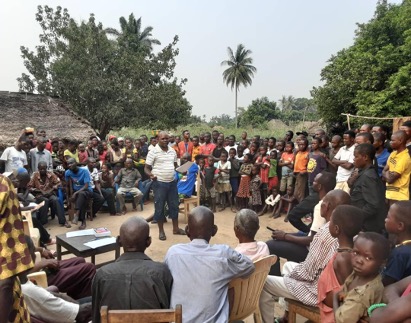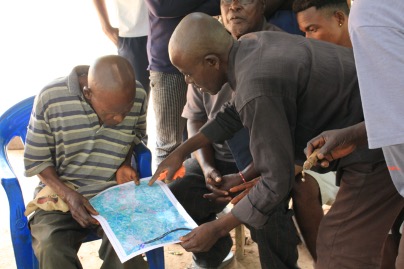Discussions during the development of a plan in Kwilu province. Photo Credit: JICA
21 September 2021: In the Democratic Republic of Congo, structuring the agricultural sector at the local level is leading to more inclusive land use management. CAFI supports this approach in eight provinces through multi-sectoral programs (PIREDD) funded through FONAREDD.
In DRC, the new decentralization and land-use planning policy has led to the legal recognition of local development committees. The number of committees created or strengthened thanks to CAFI's investment has reached 745 by the end of 2020, spread over the provinces of Kwilu, Mai Ndombe, Sud Ubangui, Tshopo, Ituri, Bas Uele, Equateur and Mongala.
These committees involve all resident members of the village community, and allow them to formally engage in decisions on land-use plans, water and wildlife resources. They constitute representative bodies for managing community areas.
The local development committees supported by CAFI are either new or set up on the basis of existing structures. In the province of Equateur, for example, the PIREDD Equateur has identified 165 local committees that need to be reorganized or revitalized.
These committees develop, depending on the province, simple land use plans for village territories or simple natural resource management plans (here are a few examples for the province of Mai Ndombe). The rural community is becoming a key local authority for all participatory rural development strategies.
In the Mai Ndombe province, the 480 plans developed and validated by the Local development committes cover nearly one million hectares.
A multi-stage process
The creation of a local committee is generally done in several stages. Obtaining (or not) the free, informed and prior consent of the communities is a condition, and begins with awareness-raising on the interest of local committees, climate change issues and the PIREDD.

Awareness raising for Free, Prior and Informed Consent in Kwilu Province. Photo credit: JICA
In the Kwilu PIREDD, for example, the steps are as follows. A village representative is responsible for organizing meetings with the various groups involved, including notables, heads of household, women and youth. Each group prepares the statutes and regulations of the committee in a participatory manner, presents them to the local chief, discusses them (in French and in the local language), and proposes amendments before the first elective general assembly.
The elective general assembly makes a final detailed reading of the statutes, adopts the amendments proposed by the different groups and elects the steering committee in charge of the development of the village and its territory. In Kwilu province, this steering committee must be composed of at least 30 percent women.
The statutes validated by the elective general assembly and the documents appointing the elected members are signed and then deposited with the locality chief and the sector chief, who registers them and forwards them to the territorial administration, which examines their conformity with the law on associations.
An essential structure for managing rural development in villages
Local development committees facilitate the supervision of agricultural practices and sectors. Although it is still too early to measure the impact on agricultural practices and forest cover around villages, collective decisions are already leading to better governance. In the Mai Ndombe Province, for example, local conflicts related to land use have been reduced in the sectors where local development committees are most advanced.

